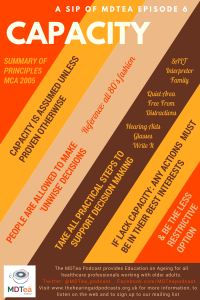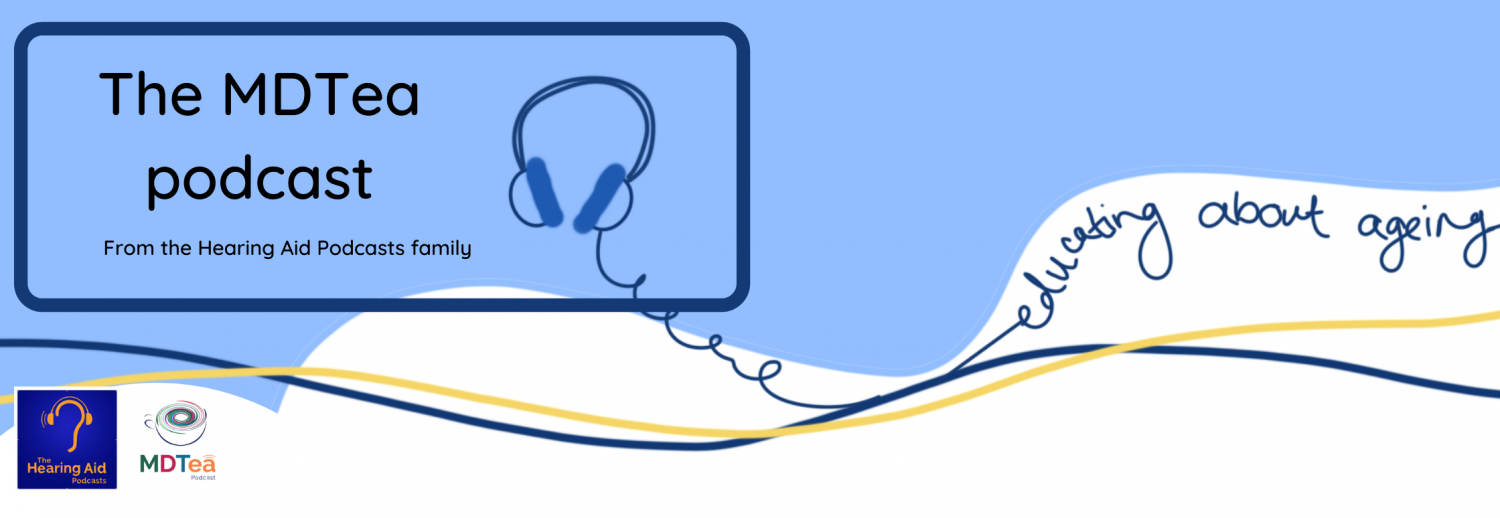Episode 1.6 Capacity
MDTea Episode 6: Capacity
Posted 29th March 2016
Presented by: Jo Preston & Iain Wilkinson, Geriatricians at Surrey and Sussex Healthcare NHS Trust.
Core Faculty Contributors: Tracy Szekely, Occupational Therapy Lecturer at University of Brighton and Lucy Frost, Dementia Nurse Specialist and Lead at Sussex Community Trust.
Guest Faculty Contributor: Dr Kim Kok, Geriatrics Registrar in South East London.
 This episode will outline how to assess mental capacity.
This episode will outline how to assess mental capacity.
Here is this week’s Sip of MDTea summarising the principles of the Mental Capacity Act (MCA) 2005.
CPD log
Click here to log your CPD online and receive a copy by email.
You can download the show notes here.
Episode 6 Show Notes
Capacity
Presented by: Dr Jo Preston & Dr Iain Wilkinson
Core Faculty: Tracy Szekely, Occupational Therapist & Lucy Frost, Dementia Nurse Specialist.
Guest Facutly: Kimberley Kok, Geriatrician.
Broadcast Date: 28th March 2016
Learning Outcomes
Knowledge:
- To know the core guiding principles of the mental capacity act
- To understand that the MCA applies to many things that we do
- To know what a ‘disorder of mind / brain’ is
- To understand that a best interests assessment is an assessment of relative risk
Skills:
- To be able to undertake a simple assessment of a person’s mental capacity
Attitudes:
- To treat someone who does not have mental capacity for a particular decision with the same compassion and care as someone with capacity for that decision
- Know that people are allowed to make what appear unwise decisions.
Definitions:
No definition this time as this episode concentrates on the application of the Mental Capacity Act 2005. The references for this episode are the documents themselves.
Mental Capacity Act 2005 & MCA 2005 – Code of Practice
Key Points from Discussion
There are 5 core principles to the act:
- A person must be assumed to have capacity unless it is established that he lacks capacity.
- A person is not to be treated as unable to make a decision unless all practicable steps to help him to do so have been taken without success.
- A person is not to be treated as unable to make a decision merely because he makes an unwise decision.
- An act done, or decision made, under this Act for or on behalf of a person who lacks capacity must be done, or made, in his best interests.
- Before the act is done, or the decision is made, regard must be had to whether the purpose for which it is needed can be as effectively achieved in a way that is less restrictive of the person’s rights and freedom of action.
It is important to remember that capacity is DECISION SPECIFIC. Capacity must be assessed for each decision separately. There is no such thing as a ‘blanket’ capacity assessment. A person may have capacity for some decisions but not for others depending on the complexity of the question. Just because a person lacks capacity in one area, does not mean they should be assumed to lack capacity for all decisions.
When someone lacks capacity for a given decision the team looking after the patient must involve their family members / wider social and cultural circle to make a decision in the patient’s best interests. The involvement of social services, the MDT, relatives , carers etc. etc. is key to this process.
There is a two stage process for assessing capacity to make decisions:
1 – Diagnostic Test
This asks ‘is there a disorder of the brain or mind’ which might be influencing this person’s ability to make decisions at this present time? If so, then a judgement needs to be made firstly on whether the impairment is likely to recover. For example, if the person has a severe pneumonia or a delirium, the person may recover capacity at a later stage. Secondly, a judgement needs to be made on the urgency of the decision in question. Could the decision wait for the person to recover if the impairment of brain or mind is temporary?
2 – Capacity Test
For a capacity assessment to be valid in a court of law, you must demonstrate AND document each of these areas of decision making. To demonstrate capacity the person must be able to (and be support to):
- Understand the information around the decision being made and why they need to make it
- Weigh Up the risks / consequences of making or not making the decision
- Retain the information long enough to make a decision
- Communicate can the person communicate it back to you? This can be in any communication form e.g. verbally, in written form, using sign language. A SALT may be helpful if this is a particular barrier.
Communication can impact on the interpretation of the capacity assessment significantly, so it is important to be conscious of this throughout the process. Involve a Speech and Language Therapist if communication is difficult, as they may have additional tools / methods to support the person to be an active participant in the process. One study showed that those who appeared to have good communication skills were more likely to be deemed to have capacity, even if they did not.
A Long Road to Travel: link
Additional terms to be aware of:
Deprivation of Liberty Safeguards (DOLS)
These are locally managed by councils and should be considered whenever a person is being deprived of their liberty.
Independent Mental Capacity Advocates (IMCAs)
People who can act as an advocate for a person who does not have anyone else to do so, in making a decision.
Power of Attorney
Legally appointed to make decisions on another person’s behalf in the event that they lose capacity to make decisions for themselves. They must be appointed whilst the person has capacity to make the decision to do so and they only become effective when that person loses capacity. They can not make decisions on their behalf prior to this. There are two types of power of attorney: social & welfare, and healthcare.
You must see the legal document to be able to act on it. It must also be registered to be effective. If in any doubt at all, ask your trust’s legal team to review the document for you. This is the safest thing to do so we would encourage you to do this. Once confirmed that the power of attorney is in place and that the person in question lacks capacity, the power of attorney’s decisions are to be considered the same as the patient’s and they should be consulted in the same way you would consult with your patient.
Curriculum Mapping:
This episode covers the following areas (n.b not all areas are covered in detail in this single episode):
| Curriculum | Area |
| NHS Knowledge Skills Framework | Suitable to support staff at the following levels:
|
| Foundation Curriculum 2012 | Section 1: Professionalism
Section 2: Relationship and communication with patients
Section 4: Ethical and Legal Issues
Section 6: Maintaining good medical practice
Section 7: Good clinical care
Section 10: Patients with long term conditions
|
| Foundation Curriculum 2016 | 2. Patient centred care
3. Ethical and legal issues 3. Mental Capacity 4. Self-directed learning 10. Support for patients with long-term conditions |
| Core Medical Training | Common Competencies
System Specific Competencies
|
| GPVTS program | Section 2.01: The GP consultation in practice
Section 3.05 – Managing older adults
Section 3.10 – Care of People with Mental Health Problems
|
| ANP (Draws from KSF) | 25. Legislation
27. Communication (Medicolegal issues) |




